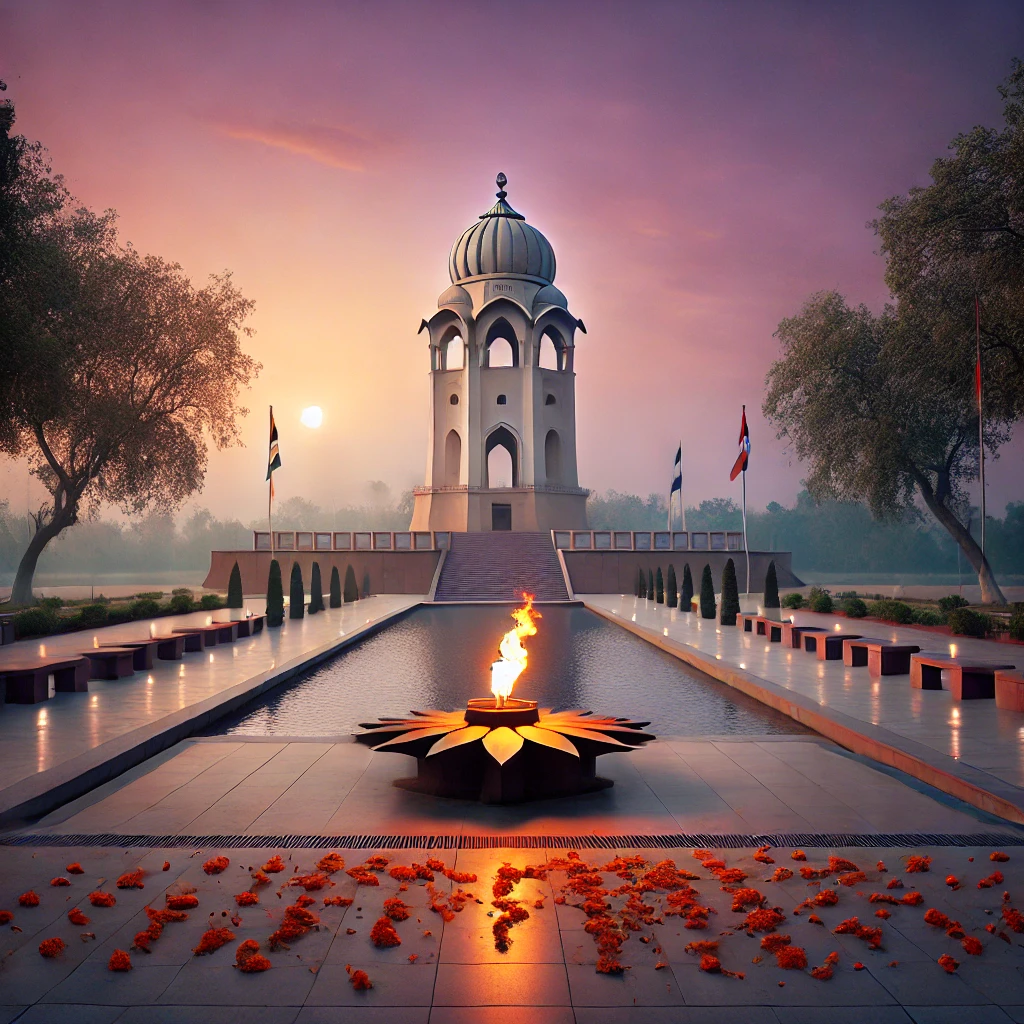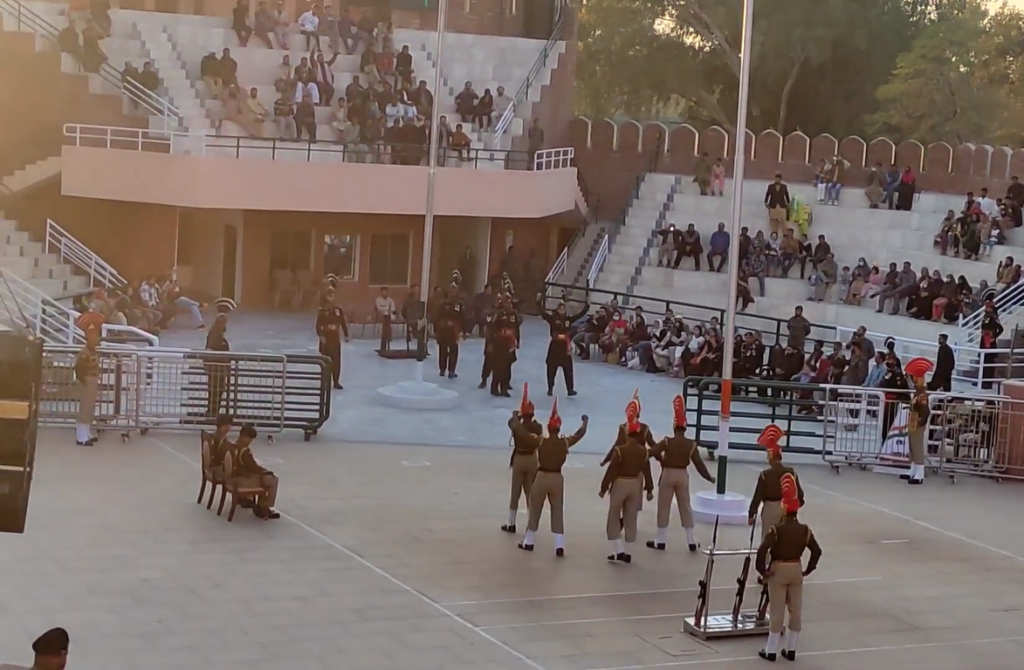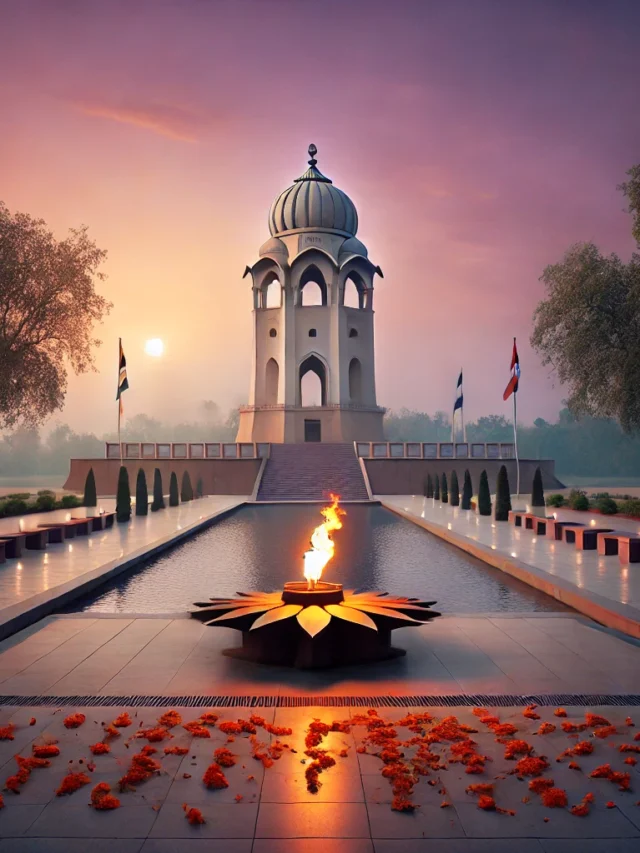Hussainiwala is a village in the Ferozepur district of Punjab, India, near the India-Pakistan border. Hussainiwala, a village steeped in patriotic fervor, holds a unique place in the hearts of Indians due to its deep historical connections to the country’s struggle for independence. The village’s profound significance stems from its role as the final resting place of some of India’s most revered freedom fighters, including Bhagat Singh, Rajguru, and Sukhdev. This legacy has imbued Hussainiwala with a powerful sense of national pride and reverence, making it a pilgrimage site for those who wish to honor the ultimate sacrifices made in the pursuit of freedom.
Table of Contents
Historical Importance

Hussainiwala National Martyrs Memorial, Hussainiwala Border
This town is perhaps best known as the cremation site of three of India’s most revered freedom fighters—Bhagat Singh, Rajguru, and Sukhdev. These young revolutionaries were executed by the British Government on March 23, 1931, in Lahore (now in Pakistan).
After their execution, their bodies were secretly taken to the banks of the Sutlej River at Hussainiwala Border, where they were cremated hastily by the British authorities to avoid public outcry. However, the place has since become a symbol of their martyrdom.
The site was later developed into the Hussainiwala National Martyrs Memorial, a place of pilgrimage for many Indians who come to pay their respects to these heroes of the independence movement. The memorial is marked by a large, towering structure, and the site sees a large number of visitors, especially on March 23, known as Shaheed Diwas (Martyrs’ Day), when people gather to pay homage to these great revolutionaries.
This memorial was established in 1968 to commemorate the martyrdom of Bhagat Singh, Rajguru, and Sukhdev. The memorial complex includes the Samadhi (cremation spot) of these three martyrs and the Samadhi of Bhagat Singh’s mother, Vidyavati Kaur.
The Hussainiwala National Martyrs Memorial stands as a symbol of courage and sacrifice, reminding visitors of the immense price paid for India’s freedom.
Partition and Post-Independence History
Impact of Partition
During the Partition of India in 1947, Hussainiwala was a flashpoint due to its proximity to the newly drawn border between India and Pakistan. Initially, the village was on the Pakistan side of the border, but it was later exchanged in 1961 when India handed over 12 villages to Pakistan in return for Hussainiwala and some other border territories.
1971 Indo-Pak War
Hussainiwala also gained military significance during the 1971 Indo-Pak War. The area witnessed fierce fighting, and the Martyrs’ Memorial was damaged but later reconstructed. The village’s strategic location made it a point of contention, and its capture by Pakistani forces was a major event during the war.
Border Ceremony
Hussainiwala Border is one of the few locations along the India-Pakistan border where a daily flag-lowering ceremony is conducted. Similar to the more famous ceremony at Wagah Border, this event draws visitors from both India and Pakistan who come to witness the synchronized drills, the lowering of the national flags, and the symbolic closing of the gates at sunset. The ceremony is a display of the military prowess of both nations and is imbued with national pride.

Geographical Context
Hussainiwala is located on the banks of the Sutlej River, which forms a natural border between India and Pakistan in this region. The village is about 11 kilometers from Ferozepur city and is accessible by road.
Cultural Context
The village and its surroundings are steeped in Punjabi culture, reflecting the rural lifestyle of the region. The people of Hussainiwala and nearby areas are primarily involved in farming, and the area is known for its lush green fields, a characteristic feature of Punjab’s landscape.
The atmosphere in Hussainiwala is charged with a sense of patriotism. The very air seems to echo the stories of bravery, resistance, and the unyielding spirit of those who fought against colonial rule. The memorial stands as a solemn reminder of the price of freedom, and the entire village exudes an aura of respect and reverence.
Tourism and Pilgrimage
Hussainiwala attracts many tourists and patriots who come to pay homage to the Martyrs’ Memorial. The site is particularly crowded on March 23, celebrated as Shaheed Diwas (Martyrs’ Day) in memory of Bhagat Singh, Rajguru, and Sukhdev. The day is observed with patriotic songs, speeches, and events that remind the visitors of the valor and dedication of these freedom fighters. Find more tourism places on our official blog – Indian Wanderer
Research Scholars interested in India’s freedom struggle, Hussainiwala serves as an educational site where they can learn about the sacrifices made by young revolutionaries. The site also attracts students, historians, and tourists who come to learn about the freedom movement and the pivotal role played by these martyrs. The village serves as an educational hub where the younger generation can connect with the history of India’s independence.
Legacy
Hussainiwala stands as a symbol of India’s enduring spirit of resistance against colonial oppression. The stories of Bhagat Singh, Rajguru, and Sukhdev resonate deeply with the Indian consciousness, and Hussainiwala, as the final resting place of these martyrs, continues to inspire generations. The village is a testament to the bravery, sacrifice, and unyielding desire for freedom that defined India’s independence movement.
The cultural impact of Hussainiwala extends beyond its borders. The village has inspired songs, literature, and films that celebrate the lives of Bhagat Singh and his comrades. Their legacy continues to inspire not just the people of Punjab but all Indians, and Hussainiwala remains a symbol of the enduring fight for justice and equality.
How to Reach
Hussainiwala is also well-connected to major transportation hubs, making it accessible for visitors from various parts of India.
By Air
It is located approximately 124 kilometers from Shri Guru Ram Dass International Airport in Amritsar, making it a convenient visit for those traveling from the heart of Punjab. For those coming from further afield, the village is 242 kilometers from Chandigarh International Airport, a major gateway to the region. Additionally, Hussainiwala is 428 kilometers from Indira Gandhi International Airport in New Delhi, the nation’s capital, offering access to visitors from across India and the world. These distances highlight Hussainiwala’s connectivity, enabling people from different regions to easily visit and pay their respects at this site of national importance.
By Train
Hussainiwala is conveniently located close to key railway stations, enhancing its accessibility for visitors traveling by train. The village is situated just 12.1 kilometers from the Ferozepur Cantt Railway Station, which is a major rail hub in the region, connecting it to various parts of Punjab and beyond. Additionally, it is only 7.4 kilometers from the Ferozepur City Railway Station, making it even more accessible for those coming from nearby areas. These short distances from the railway stations make Hussainiwala an easy and convenient destination for those wishing to visit the Martyrs’ Memorial and experience the village’s historical and patriotic significance.
By Road
Hussainiwala is easily reachable by road, thanks to its proximity to major bus terminals in Ferozepur. The village is approximately 11.5 kilometers from the Firozpur Cantt Bus Stand, which is about a 19-minute drive, making it a convenient stop for travelers arriving by bus. Additionally, the Bus Terminal in Ferozepur City is about 9.5 kilometers away, roughly a 22-minute journey, further enhancing accessibility. These short travel times from the main bus stands make Hussainiwala an easily accessible destination for those using public transportation, allowing visitors to comfortably explore this historically significant site.
The Hussainiwala National Martyrs Memorial, located near the Hussainiwala Border in Punjab, is a tribute to freedom fighters who sacrificed their lives for India’s independence. It marks the site where Shaheed Bhagat Singh, Rajguru, and Sukhdev were cremated after their execution in 1931.





